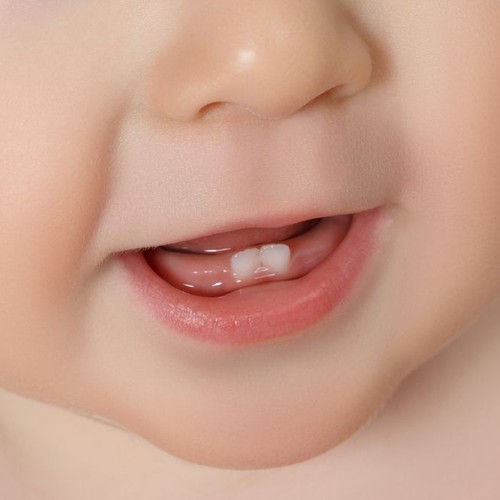Dental Caries in the Sweet Embrace of Breastfeeding
Breastfeeding has been recognized as one of the best ways to provide nutrition for newborns. However, did you know that breastfeeding also plays an important role in the oral health of infants and children under the age of one? Studies have shown a significant link between breastfeeding and the risk of developing dental caries in children.
Dental caries is a common dental issue among children with long-term impacts that can affect both oral health and overall health. Dental caries not only causes pain but can also affect the growth of teeth and jawbone development. These negative effects can persist into adulthood.
Breastfeeding offers various health benefits to infants, including boosting the immune system, protection against infections, and healthy body development. Additionally, breast milk helps in forming strong teeth and jaw structures.
Although breastfeeding offers numerous benefits, some argue that there is a connection between prolonged breastfeeding and an increased risk of dental caries in children. This condition is often referred to as "bottle caries," where infants or children are constantly exposed to sugary liquids such as formula milk or fruit juices in bottles or sippy cups.
Studies by Tanaka et al. (2018) & Tham et al. (2015) show a relationship between breastfeeding and dental caries in preschool-aged children (under 5 years old). The findings reveal that children exclusively breastfed for the first six months of life have a lower risk of developing dental caries compared to children who are given formula milk.
Meanwhile, studies in Brazil and the Netherlands found that breastfeeding beyond six months also leads to a lower risk of dental caries (Kramer et al., 2012 & Azevedo et al., 2018).
However, Tham et al. (2015) suggest that breastfeeding beyond 12 months can increase the risk of dental caries when frequent nighttime breastfeeding occurs, as teeth are exposed to lactose-containing milk for extended periods without proper oral care after the child falls asleep.
Dental caries in infants and children can result from factors other than breast milk. Poor oral hygiene and excessive intake of sugary foods are major contributors to the development of dental caries. If not properly addressed by parents or caregivers, this can affect the dental health of infants and children.
These studies provide strong evidence that exclusive breastfeeding for the recommended duration can help reduce the risk of dental caries in infants and children. As a preventive measure, to ensure that children benefit from breastfeeding without increasing the risk of dental caries, the following strategies should be implemented:
Practice smart breastfeeding: Exclusively breastfeed for the first six months of life and continue breastfeeding until the child is 2 years old.
1. Limit the use of bottles and sippy cups: Avoid giving sugary liquids such as formula, fruit juices, or sweetened drinks in bottles or sippy cups throughout the day.
2. Use regular cups or glasses to monitor the child’s drinking habits.
3. Maintain oral and dental hygiene:
- Before teeth erupt: Start cleaning the infant's gums (before teeth come in) with a soft, damp cloth daily.
- Once the first tooth erupts: Use a soft toothbrush for infants who have erupted teeth, at least twice a day, especially after meals and before sleep. A smear of fluoride toothpaste is recommended. For children 3 years and older, use a fluoride toothpaste the size of a pea.
- Tongue brushing: It is beneficial to clean the tongue with a soft cloth dampened with water to reduce the risk of fungal infections such as Candida and ensure the mouth stays clean.
4. Start dental check-ups as soon as the first tooth erupts.
Breastfeeding forms the foundation for healthy development in infants and children. However, parents need to be aware of the potential risk of dental caries that may arise if breastfeeding is not managed wisely. With proper awareness and correct practices, we can ensure that children enjoy the benefits of breastfeeding without neglecting their oral health.
References:
- American Academy of Pediatrics. (2012). Policy Statement: Breastfeeding and the Use of Human Milk. Pediatrics, 129(3), e827-e841.
- American Dental Association. (n.d.). Breastfeeding and Dental Decay. http://www.ada.org/resources/research/science-and-research-institute/oral-health-topics/breastfeeding-and-dental-decay
- World Health Organization. (2019). Infant and Young Child Feeding. http://www.who.int/news-room/fact-sheet/detail/infant-and-young-child-feeding
- Tanaka K, Miyake Y, Sasaki S, Hirota Y. Breastfeeding and Dental Caries in Preschool Children. The Japan Environment and Children’s Study. Pediatric Dentistry. 2018. Nov 15;40(7): 460-466
- Kramer MS, van der Pal-de Bruin K, Plat AW, Jaddoe VW, Hofman A, Steegers EA, Ghosh D, Bhutta ZA, Humphrey T, Felix JF, Kruithof CJ. The Association of Breastfeeding Duration and Early Childhood Caries: A Prospective Cohort Study. Caries Research. 2013;47(3): 531-540
- Azevedo MS, Scheutz F, Álvares DP, Olandoski M, Barros AJ. The Association Between Breastfeeding and Dental Caries in Brazilian Preschool Children. Community Dentistry and Oral Epidemiology. 2018 Feb;46(1):53-61
- Tham, R., Bowatte, G., Dharmage, S., Tan, D., Lau, M., Dai, X., Allen, K., and Lodge, C. (2015), Breastfeeding and the Risk of Dental Caries: A Systematic Review and Meta-Analysis. Acta Paediatr, 104: 62-84. https://doi.org/10.1111/apa.13118
- Shrestha, S.K.; Arora, A.; Manohar, N.; Ekanayake, K.; Foster, J. Association of Breastfeeding and Early Childhood Caries: A Systematic Review and Meta-Analysis. Nutrients 2024, 16, 1355. https://doi.org/10.3390/nu16091355






